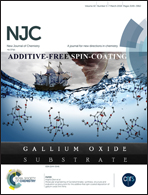The cytochrome c–cyclo[6]aramide complex as a supramolecular catalyst in methanol†
Abstract
A hydrogen-bonded macrocycle, cyclo[6]aramide, was found to form a supramolecular complex with cytochrome c, which enables the solubilization of the heme protein in methanol. The supramolecular complexation was evidenced by UV-vis, CD, and Raman spectroscopic techniques via structural characterization. Computational simulation based on the DFT method reveals the presence of strong hydrogen bonds formed between the lysine residues exposed on the protein surface and the oxygen atoms residing in the cavity of cyclo[6]aramide apart from cation–π interactions. The resulting cytochrome c–cyclo[6]aramide 1 exhibited higher activities than unmodified cytochrome c in the oxidation of benzhydrol to benzophenone with hydrogen peroxide at low temperatures. The enhanced activity with lowering temperature up to −40 °C indicates that the complex can act as a “cold-active” synzyme. The results achieved here demonstrate the potential of hydrogen-bonded macrocycles in supramolecular chemistry for catalytic reactions via ligand–protein interactions.
![Graphical abstract: The cytochrome c–cyclo[6]aramide complex as a supramolecular catalyst in methanol](/en/Image/Get?imageInfo.ImageType=GA&imageInfo.ImageIdentifier.ManuscriptID=C7NJ02741A&imageInfo.ImageIdentifier.Year=2018)


 Please wait while we load your content...
Please wait while we load your content...